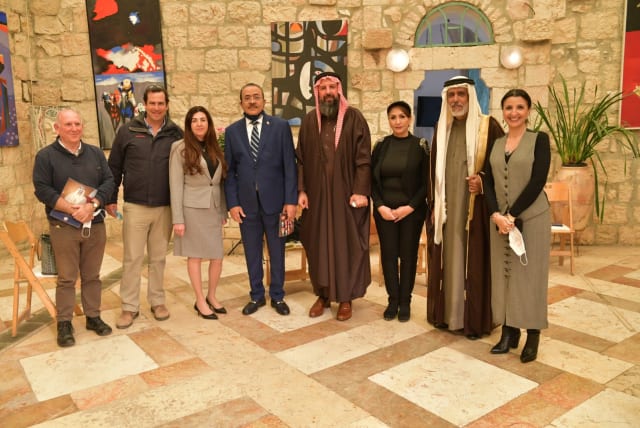UAE-Israel trade soars as Israel secures its Middle East reputation

Over 250 cultural events in the UAE, Bahrain and Morocco will bring together Israelis and their new-found partners in the region, a 50% increase from 2021.
Historians of the future will view the first years of the 2020s as the pivot in Israel’s position in the Middle East.
If 2020 was the year of the signing of the Abraham Accords, and 2021 was the year in which the infrastructure of peace was laid, 2022 will be the year in which Israel became an integral part of the political, economic and cultural fabric of the Middle East. It is also when we can expect business to soar.
The signs are unmistakable, and more meaningful than we could have imagined in September 2020, when the United Arab Emirates, Bahrain and Israel signed peace agreements on the White House Lawn.
Since then, there has been $1.5 billion in trade between Israel and the Abraham Accords countries; over 100 governmental agreements covering visas, energy, finance, tourism, tax and defense; and more than 200,000 Israelis openly touring the UAE, despite the weakest year for tourism in anyone’s memory due to the pandemic.
Over the past year and a half, hundreds of Israeli companies established operations in the Gulf, while Abu Dhabi’s leading investment funds took stakes in Israeli companies showing exciting potential.
Ambassadors Mohamed Al Khaja and Khaled Al Jalahma have become local celebrities in Israel, Ambassador Eitan Na’eh is a familiar face in both UAE and Bahrain, and Ambassador Amir Hayek has already made a tremendous impact in his few months since arriving in the UAE. Hebrew concerts, cultural events, business delegations,
Holocaust commemorations, public Hanukkah candle lightings, and of course the Israel Pavilion at Dubai Expo have made Israel and Jewish life familiar to most Emiratis.
When we established the UAE-Israel Business Council in June 2020 – several months before the Abraham Accords were signed – we sought to establish a bridge between the many Israelis and Emiratis who were already quietly meeting, trading, and cooperating on a range of initiatives.
Who could have imagined the enthusiasm and warmth that awaited us?
Fast forward 18 months: the UAE-Israel Business Council has developed into a community of over 5,000 entrepreneurs, professionals, investors, companies, and government officials who regularly meet through an ever-expanding range of conferences, mixers, webinars, delegations, and in-person events. We are joined by sister organizations such as the Gulf-Israel Women’s Forum, the first association bringing together female leaders from across the Middle East, and the Gulf-Israel Policy Forum, which brings together academics, policy-makers, and cultural leaders from across the region.
The stars are definitely aligning, and 2022 is set to be a breakthrough year for the Abraham Accords, building on the enormous progress achieved since they were signed.
Over the past 18 months, the infrastructure of peace was laid. Trade, visa and security protocols were signed; ambassadors were exchanged, and embassies opened; Emiratis, Bahrainis, Moroccans and Sudanese made first contact with Israelis and Jews from across the world; and the stigma of engaging with Israel fell away in much of the Middle East.
In fact, we receive daily messages from Saudi Arabia, Kuwait, Iraq, Pakistan, and Indonesia asking to connect with Israelis and asking when peace agreements will be signed with them. The grassroots support for a new Middle East and Muslim-Jewish engagement is rapidly taking hold.
So what can we expect in the new year? The UAE-Israel Business Council forecasts for 2022 suggest that this will be the year when normalization becomes the norm, with trade as the best gauge of progress:
Bilateral UAE-Israel trade in goods and services will reach $2 billion, an increase of 50% over 2021, with significant growth in tourism, agriculture, investment, cleantech and professional services.
Trade between Israel and the other Abraham Accords countries will jump to as much as $1 billion, with a strong uptick in trade with Egypt and Jordan, where the stigma of trading with Israel is gradually falling away.
More than 500 Israeli companies will have business dealings in the UAE, including 250 with a permanent presence or collaboration with a UAE partner.
Aerospace and defense cooperation will increase, with IAI, Rafael, Elbit and many smaller companies selling to or establishing joint ventures in the UAE. And 300,000 Israelis will visit Abraham Accords countries, mainly to the UAE but with significant growth in traffic to Morocco and Bahrain as well. Covid permitting, Gulf tourism to Israel will reach 50,000-100,000 tourists.
Over 250 cultural events in the UAE, Bahrain and Morocco will bring together Israelis and their new-found partners in the region, a 50% increase from 2021 and something that was almost unimaginable a short time ago.
Looking beyond the numbers, these developments also hold important lessons for those, like us, who are committed to co-existence between Israel and her neighbors, between Jews and their Arab neighbors. Peace agreements are only as strong as the relationships that take hold among the people of the region.
Personal ties, cultural dialogue and business activity are the foundation of a warm and enduring peace. We created the council as a way to democratize the relationship by building peer-to-peer communities, mutual prosperity and goodwill.
As we look to 2022, we envision a year in which the Abraham Accords and normalization are no longer concepts to be discussed, but rather the new normal across the region.
Fleur Hassan-Nahoum is the deputy mayor of Jerusalem and co-founder of the UAE-Israel Business Council. Dorian Barak is an Israeli-American businessman long active in the Gulf and co-founder of the UAE-Israel Business Council.
Jerusalem Post Store
`; document.getElementById("linkPremium").innerHTML = cont; var divWithLink = document.getElementById("premium-link"); if (divWithLink !== null && divWithLink !== 'undefined') { divWithLink.style.border = "solid 1px #cb0f3e"; divWithLink.style.textAlign = "center"; divWithLink.style.marginBottom = "15px"; divWithLink.style.marginTop = "15px"; divWithLink.style.width = "100%"; divWithLink.style.backgroundColor = "#122952"; divWithLink.style.color = "#ffffff"; divWithLink.style.lineHeight = "1.5"; } } (function (v, i) { });
